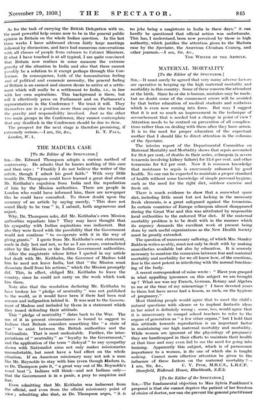MATERNAL MORTALITY
[To the Editor of the SPECTATOR.] Sin,—It must surely be agreed that very many adverse factor,' are operative in keeping up the high maternal mortality and morbidity in this country. Some of these concern the attendant at the birth. Since he or she is human, mistakes may be made. but no doubt some of the commonest errors will be avoided by that better education of medical students and midwives which is even now coming into force. But may I suggest that it is not so much an improvement in the technique of accouchement that is needed but a change in point of view ? Attention needs to be centred on prevention of all complica- tions rather than on dealing with them after they have arisen. It is to the need for proper education of the expectant mother that I should like to direct attention in the columns of the Spectator.
The interim report of the Departmental Committee on Maternal Mortality and Morbidity shows that sepsis accounted for 38.6 per cent, of deaths in their series, eclanipsia (a severe toxaemia involving kidney failure) for 13.6 per cent. and other toxaemias for 6.2 per cent. Now it is common knowledge that resistance to sepsis is enormously enhanced by good health. No one can be expected to maintain a proper standard of health without some knowledge of simple personal hygiene, such as the need for the right diet, outdoor exercise and fresh air.
There is much evidence to show that a somewhat spare diet, including little meat but not lacking in the necessary fresh elements, is a great safeguard against the toxaernias. In certain countries of Europe celampsia almost disappeared during the Great War and this was attributed by responsible local authorities to the enforced War diet. If the maternal mortality problem is to be dealt with in the manner which its urgency demands the excellent work at present being done by such useful organizations as the New Health Society must be greatly extended.
. The question of unnecessary suffering, of which Mrs. Stanley Baldwin writes so ably, must not only be dealt with by making anaesthetics available but also by education. It is scarcely necessary to mention the connexion between fear and maternal mortality and morbidity for we all know how, of the emotions, fear is the most potent in interfering with the normal function- ing of the body.
A recent correspondent of mine wrote : "Have you grasped in what appalling ignorance on this subject we are brought up ? What use was my French, German, Botany and Algebra to me at the time of my miscarriage I have devoted years to them but have never had a lesson, as such, on the hygiene of. pregnancy."
Most thinking people would agree that to meet the child's natural questions with silence or to implant fantastic ideas in her mind is definitely wrong ; some, too, would agree that it is unnecessary to compel school teachers to refer to the organs of generation as "a few other organs," but I hold that this attitude towards reproduction is an important factor in maintaining our high maternal mortality and morbidity. While women are ignorant of the physiology of pregnancy they are handicapped in their efforts to maintain their health at that time and may even fail to see the need for going into training. Apparently this subject, which is of paramount importance to a woman, is the one of which she is taught nothing. Cannot more effective attention be given to the influence of these factors on the maternal mortality ?—










































 Previous page
Previous page